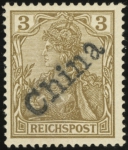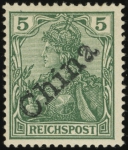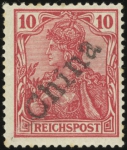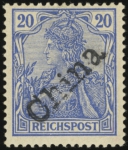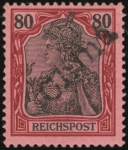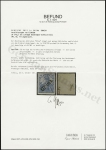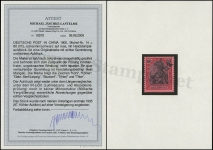Tientsin Provisionals
During the Boxer Rebellion, there was a great shortage of postage at the German post offices in China. To remedy this shortage, German and Kiautschou postage was used in a variety of provisional forms. Among these were the Tientsin Provisionals.
Upon the deployment of large numbers of German forces to China, a large quantity of Germania postage had been sent to the German feldpost service in China. Due to the shortage of postage at the civilian post offices, a quantity of 3- to 80-Pfennig Germania issues were given to the post office in Tientsin.
The currency in use in China had a rate of exchange at the German postal offices of 2.50 Mark/Dollar, while on the free market the exchange rate was 2 Mark/Dollar. Therefore, private persons could buy unoverprinted stamps and realize a 25% profit by returning them to Germany. To guard against this, the Tientsin postmaster ordered that these stamps be overprinted with the word “China” before being sold at the counter.
The overprints were valid until 31 December 1902.
Tientsin Provisionals
During the Boxer Rebellion, there was a great shortage of postage at the German post offices in China. To remedy this shortage, German and Kiautschou postage was used in a variety of provisional forms. Among these were the Tientsin Provisionals.
Upon the deployment of large numbers of German forces to China, a large quantity of Germania postage had been sent to the German feldpost service in China. Due to the shortage of postage at the civilian post offices, a quantity of 3- to 80-Pfennig Germania issues were given to the post office in Tientsin.
The currency in use in China had a rate of exchange at the German postal offices of 2.50 Mark/Dollar, while on the free market the exchange rate was 2 Mark/Dollar. Therefore, private persons could buy unoverprinted stamps and realize a 25% profit by returning them to Germany. To guard against this, the Tientsin postmaster ordered that these stamps be overprinted with the word “China” before being sold at the counter.
The overprints were valid until 31 December 1902.

